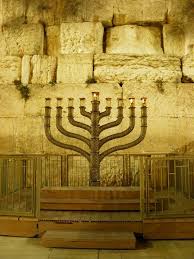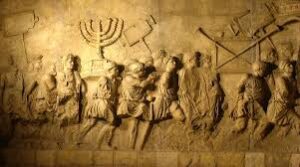Yesterday, today and tomorrow, the light of the Menorah shines from window after window in Israel. What is this ancient candelabra? What meaning should it have for all of us? Would it shock you to learn the Theodore Herzl once knew nothing of our Chanukah tradition?
Over a hundred years ago, a young Austrian Jewish writer – assimilated and knowing little to nothing about his heritage, invited the Chief Rabbi of Vienna to his house to discuss a crazy idea that he had. When the Rabbi arrived, the young Jew asked the Rabbi if he would join the family in lighting.
It was Chanukah, and the Rabbi thought he was being asked to join in lighting the Menorah…he was shocked to find that the young man was about to light a Christmas tree instead. The Rabbi stopped the young man and convinced him to light a Menorah instead. It was a lesson that would change that young man’s life…mine, and probably yours as well.
Theodore Herzl’s Quest
Theodore Herzl was a young, assimilated writer, the father of what would in time come to be known as Zionism. He dreamed, identified a need. He envisioned a reality in which the Jewish people returned to their ancient homeland to recreate, re-establish the nation stolen from them. That was Herzl’s crazy idea; that is our wonderful reality this Chanukah, more than 100 years after Herzl lit a menorah for the first time.
At one point, Herzl thought the solution to the “Jewish problem” was to have the Jews convert to Christianity. Spurred on by witnessing the Dreyfus trial, Herzl realized the impossibility of his initial thoughts. There would be no home for the Jews in the land of the Christians, lands where Jews were hounded, accused of crimes they did not commit, attacked, persecuted and murdered.
After meeting with the Rabbi, Herzl began to believe that what the Jews needed most…was what they already had. A combination of the religion and our homeland. Some mistakenly call Herzl an “apicurous” – a heretic, for lack of a better word, but to be one, you have to know and reject…not just be ignorant.
Herzl was simply ignorant…until 1897 when he publicly declared that there could be no return to Israel, without a return to Judaism as well. He never did get a chance to return to Israel during his life…but because of his foresight, Israel flourishes probably well beyond even what Herzl could have dreamed possible. After that meeting with the Rabbi, Theodore Herzl wrote the following article:
The Menorah (by Theodore Herzl)
Deep in his soul, he began to feel the need of being a Jew. His circumstances were not unsatisfactory; he enjoyed ample income and a profession that permitted him to do whatever his heart desired. For he was an artist.
His Jewish origin and the faith of his fathers had long since ceased to trouble him, when suddenly, the old hatred came to the surface again in a new mob-cry. With many others, he believed that this flood would shortly subside. But there was no change for the better. In fact, things went from bad to worse; and every blow, even though not aimed directly at him, struck him with fresh pain, until little by little, his soul became one bleeding wound.
These sorrows, buried deep in his heart and silenced there, evoked thoughts of their origin and of his Judaism, and now he did something he could not perhaps have done in the old days because he was then so alien to it. He began to love his Judaism with an intense fervor.
The New Yearning
Although in his own eyes he could not, at first, justify this new yearning, it became so powerful at length that it crystallized from vague emotions into a definite idea which he needed to express. It was the conviction that there was only one solution for this Judennot – the return to Judaism.
When this came to the knowledge of his closest friends, similarly situated though they were, they shook their heads gravely and even feared for his reason. For how could that be a remedy which merely sharpened and intensified the evil?
It seemed to him, on the other hand, that their moral distress was so acute because the Jew of today had lost the poise which was his father’s very being. They ridiculed him for this when his back was turned – many even laughed openly in his face. Yet, he did not allow himself to be misled by the banalities of these people whose acuteness of judgment had never before inspired his respect, and he bore their witticisms and their sneers with equal indifference.
And, since, in all other respects, he acted like a man of his senses, they suffered him gradually to indulge his infatuation, which a number of them soon began to call by a harsher term than idee fixe [obsession]. He continued, however, with characteristic persistence, to develop one idea after another from his fundamental conviction. At this time, he was profoundly moved by several instances of apostasy, though his pride would not permit him to betray it.
On Non-Jewish Habits and Other Cultures
As a man and as an artist of the modern school, he had, of course, acquired many non-Jewish habits and his study of the cultures of successive civilizations had left an indelible impression upon him. How was this to be reconciled with his return to Judaism?
Often doubts assailed him as to the soundness of his guiding thought, his idée maîtresse [main or guiding thought], as a French thinker calls it. Perhaps this generation, having frown up under the influence of alien cultures, was no longer capable of that return which had perceived to be their redemption.
But the new generation would be capable of it, if it were only given the right direction early enough. He resolved, therefore, that his own children, at least, should be shown the proper path. They should be trained as Jews in their own home.
Hitherto, he had permitted to pass by unobserved the holiday which the wonderful apparition of the Maccabbes had illumined for thousands of years with the glow of miniature lights. Now, however, he made this holiday an opportunity to prepare something beautiful which should be forever commemorated in the minds of his children.
A Menorah to Raise Devotion to an Ancient People
In their young souls should be implanted early a steadfast devotion to their ancient people. He bought a Menorah, and when he held this nine-branched candlestick in his hands for the first time, a strange mood came over him. In his father’s house also, the lights had once burned; in his youth, now far away, and the recollection gave him a sad and tender feeling for home.
The tradition was neither cold nor dead – thus it has passed through the ages, one light kindling another. Moreover, the ancient form of the Menorah had excited his interest. When was the primitive structure of this candlestick fashioned?
The Menorah’s Design
Clearly the design was suggested by the tree – in the center the sturdy trunk, in right and left four branches, one below the other, in one plane, all all of equal height. A later symbolism brought with it the ninth branch, which projects in front and functions as a servant.
What mystery had the generations which followed one another read into this form of art, at once so simple and natural? And our artist wondered to himself if it were not possible to animate again the withered form of the Menorah. To water its roots, as one would a tree. The mere sound of the name, which he now pronounced every evening to his children, gave him great pleasure. There was a lovable ring to the word when it came from the lips of little children.
On the First Night the Candle was Lit
On the first night the candle was lit and the origin of the holiday explained. Then wonderful incident of the lights that strangely remained burning so long. The story of the return from the Babylonian exile, the second Temple, the Maccabees – our friend told his children all that he know. It was not very much, to be sure, but it served.
When the second candle was lit, they repeated what he had told them. And though it had all been learned from him, it seemed to him quite new and beautiful. In the days that followed, he waited keenly for the evenings, which became even brighter. Candle after candle stood in the Menorah. And the father mused on the little candles with his children, until at length his reflections became too deep to be uttered before them.
When he had resolved to return to his people and to make open acknowledgment of his return, he had only thought he would be doing the honorable and rational thing. But he had never dreamed that he would find in it a gratification of his yearning for the beautiful. Yet nothing less was his good fortune.
A Thing of Beauty to Inspire Lofty Thoughts
The Menorah with its many lights became a thing of beauty to inspire lofty thoughts. So, with his practical hand, he drew a plan for a Menorah to present to his children the following year. He made free use of the motif of the right branching arms projecting right and left in one plane from the central stem. He did not hold himself bound by the rigid traditional form, but created directly from nature, unconcerned by other symbolisms also seeking expression; now he was on the search for living beauty. Yet, though he gave the withered branch new life, he conformed to the law, to the gentle dignity of its being. It was a tree with slender branches; its ends were molded into flower calyxes which would hold the lights.
The week passed with this absorbing labor. Then came the eighth day, when the whole row burns. Even the faithful ninth, the servant, which on other nights is used only for the lighting of the others.
The Symbol of the Kindling of a Nation

A great splendor streamed from the Menorah. The children’s eyes glistened. But for our friend, all this was the symbol of the kindling of a nation.
When there is but one light, all is still dark, and the solitary light looks melancholy. Soon, it finds one companion, then another, and another. The darkness must retreat.
The light comes first to the young and the poor. Then others join them who love Justice, Truth, Liberty, Progress, Humanity, and Beauty.
When all the candles burn, then we must all stand and rejoice over the achievements. And no office can be more blessed than that of a Servant of the Light.
